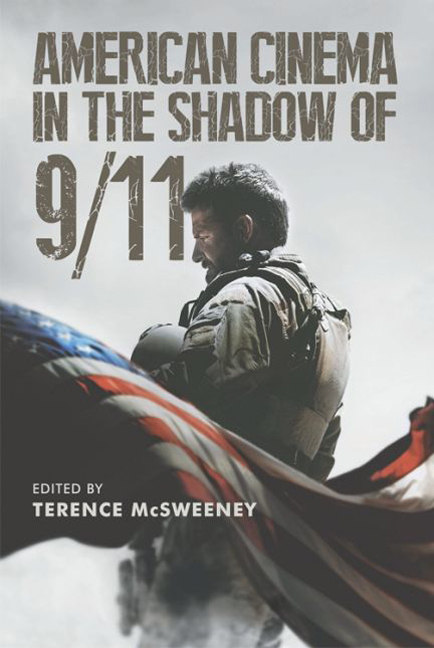Book contents
- Frontmatter
- Contents
- List of Figures
- Acknowledgements
- Foreword
- Introduction: American Cinema in the Shadow of 9/11
- Part I Dramatisations of the ‘War on Terror’
- Part II Influences of the ‘War on Terror’
- 6 ‘Not Now That Strength’: Embodiment and Globalisation in Post-9/11 James Bond
- 7 Training the Body Politic: Networked Masculinity and the ‘War on Terror’ in Hollywood Film
- 8 ‘Gettin' Dirty’: Tarantino's Vengeful Justice, the Marked Viewer and Post-9/11 America
- 9 Stop the Clocks: Lincoln and Post-9/11 Cinema
- 10 Foreshadows of the Fall: Questioning 9/11's Impact on American Attitudes
- Part III Allegories of the ‘War on Terror’
- Selected Filmography
- Notes on the Contributors
- Index
10 - Foreshadows of the Fall: Questioning 9/11's Impact on American Attitudes
from Part II - Influences of the ‘War on Terror’
Published online by Cambridge University Press: 10 May 2017
- Frontmatter
- Contents
- List of Figures
- Acknowledgements
- Foreword
- Introduction: American Cinema in the Shadow of 9/11
- Part I Dramatisations of the ‘War on Terror’
- Part II Influences of the ‘War on Terror’
- 6 ‘Not Now That Strength’: Embodiment and Globalisation in Post-9/11 James Bond
- 7 Training the Body Politic: Networked Masculinity and the ‘War on Terror’ in Hollywood Film
- 8 ‘Gettin' Dirty’: Tarantino's Vengeful Justice, the Marked Viewer and Post-9/11 America
- 9 Stop the Clocks: Lincoln and Post-9/11 Cinema
- 10 Foreshadows of the Fall: Questioning 9/11's Impact on American Attitudes
- Part III Allegories of the ‘War on Terror’
- Selected Filmography
- Notes on the Contributors
- Index
Summary
INTRODUCTION
Given the shocking events of 9/11, many have seen the fall of the Twin Towers as the fiery birth of a new epoch, as revolutionary in its own way as the storming of the Bastille. This perception was heightened by Bush administration rhetoric, which used the attacks to frame a new sense of identity and purpose in the post-Cold War environment. Yet, in looking at films prior to 9/11, we find curious portents of this new world. In Independence Day (1996), we find not only heroic American responses to an evil assault but a president who dons a flight suit to lead the counter-attack and ends the film high-fiving his fellow warriors, just as President Bush did in 2003 when he declared ‘Mission Accomplished’ in Iraq. Even more perplexingly, in The Siege (1998) we find not only the USA threatened by Arab terrorism but the military and CIA torturing naked Arab suspects in images astonishingly reminiscent of Abu Ghraib. If these films had been made after 9/11, we would unhesitatingly see them as responses to a post-9/11 world; that they were made less than five years prior to 9/11 suggests that life has started imitating art to a disturbing degree. Indeed, Robert Altman declared after the attacks that ‘Nobody would have thought to commit an atrocity like that unless they'd seen it in a movie … we created this atmosphere and taught them how to do it’ (2001). Although it is improbable that terrorists stole ideas from Hollywood blockbusters, the similarities between pre-9/11 cinema and the public response to the atrocity suggest that Hollywood cinema of the 1990s helped shape pre-formed narratives of how the nation should respond to an attack.
This essay is therefore something of a devil's advocate in relation to the main currents of scholarship studying the impact of 9/11 on American popular culture because its argument is that the terrorist attacks of September 2001 did not cause a profound change in America's selfimage, despite assertions to the contrary. As Terence McSweeney notes, ‘It became common in the months and years after 11 September to suggest that 9/11 “changed everything”, a phrase that echoed from politician to commentator and back again’ (2014: 30).
- Type
- Chapter
- Information
- American Cinema in the Shadow of 9/11 , pp. 207 - 224Publisher: Edinburgh University PressPrint publication year: 2017

